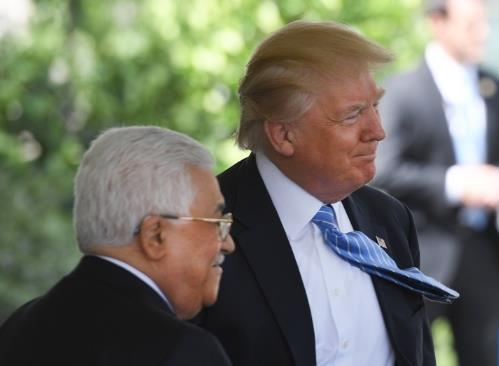The Middle East policy switch is on
- By Sumantra Maitra
 0 Comment(s)
0 Comment(s) Print
Print E-mail China.org.cn, May 22, 2017
E-mail China.org.cn, May 22, 2017
|
|
|
U.S. President Donald Trump (R) welcomes visiting Palestinian President Mahmoud Abbas at the White House in Washington D.C., May 3, 2017. [Photo/Xinhua] |
However, given that he has changed or been compelled to change his position on virtually every issue since his election, this didn't come as a surprise.
The Saudis, of course, went all out to entertain Trump. The talk in academic and diplomatic circles is that they smartly calculated, an easy way to influence Trump was by boosting his ego. I am not privy to such diplomatic maneuverings personally, of course; however, can see how much the Saudi side expected from this meeting.
Facing massive domestic upheavals, the two sides agreed on a series of military deals worth nearly $110 billion. For the 36 hours of meetings and banquets planned, the Saudi displayed Trump's pictures and murals from every skyscraper in Riyadh, viewing this as a sign of realignment of a broken tie much strained under Obama.
Obama, for all his faults, was careful not to expand military engagement in the Middle East, although under considerable pressure from the Saudi side, who viewed him as weak in handling their regional rival Iran.
The present Washington administration's symbolism therefore is seized by the Kingdom, as a sign of bedrock American Middle East engagement. Seniors officials from the American side also described the arms deal as "historic." The deal, worth $350 billion over 10 years and $110 billion immediately, was quoted as "a significant expansion of…[the] security relationship" between the two countries.
Trump said that the deal would create hundreds of billions of investment in the U.S., meaning "jobs!" and more jobs, his constant mantra in wooing the electorate.
"I also promised that America will not seek to impose our way of life on others, but to outstretch our hands in the spirit of cooperation and trust…" Trump said in his groundbreaking first major speech on Middle East affairs.
This is a subtle hint that U.S. might not be interested in nation building. He also said, "The true toll of ISIS, Al Qaeda, Hezbollah, Hamas, and so many others, must be counted not only in the number of dead," and indicated the possible opening of a counter-terrorism center based in Saudi Arabia.
Two clear signals are emerging. Trump, true to his priorities and interests, is ready to deal with anyone. There's no principle, no diktat which is not malleable. Any government, which comes to a "deal" with Trump, which talks to the president and his team, with a proper interest in investing in the United States, and ready to engage in some sort of economic mutually beneficial relationship, will be given priority in foreign policy terms.
Second, despite all the early revolutionary talk of American foreign policy changing course, Trump is very much and remains a "DC blob" president. The standard U.S. strategic pivot in the Middle East, which began to take shape in the Obama years, is over.
Following the Iranian nuclear deal, there was a lot of talk about whether the U.S. was moving towards a more balanced Iran-Saudi approach, or actually planning to withdraw from further engagement in Middle East altogether. That seems to be over.
Without any significant policy hand, Trump had to rely on the "DC blob" thinking, and the generals who are guiding his foreign policy, and retire into the tried and tested instinctive approach calling for a policy based on balancing on the Saudis.
This means he won't be willing to tolerate Iranian proxies in the Middle East, a sign we already saw, with American warplanes bombing Shia militias in Syria recently. That would have been inconceivable under Obama, but it's back on the table now, as American policy is further guided by Saudi interests.
Second, even if the nuclear deal survives, with Rouhani back in power in Teheran, Iranians might need to be careful with how much adventurism they want to attempt. And Trump needs to be careful as well, otherwise he might be compelled to support further Saudi adventurism, especially in Yemen. That would be a disaster.
Sumantra Maitra is a columnist with China.org.cn. For more information please visit:
http://www.ccgp-fushun.com/opinion/SumantraMaitra.htm
Opinion articles reflect the views of their authors only, not necessarily those of China.org.cn.






